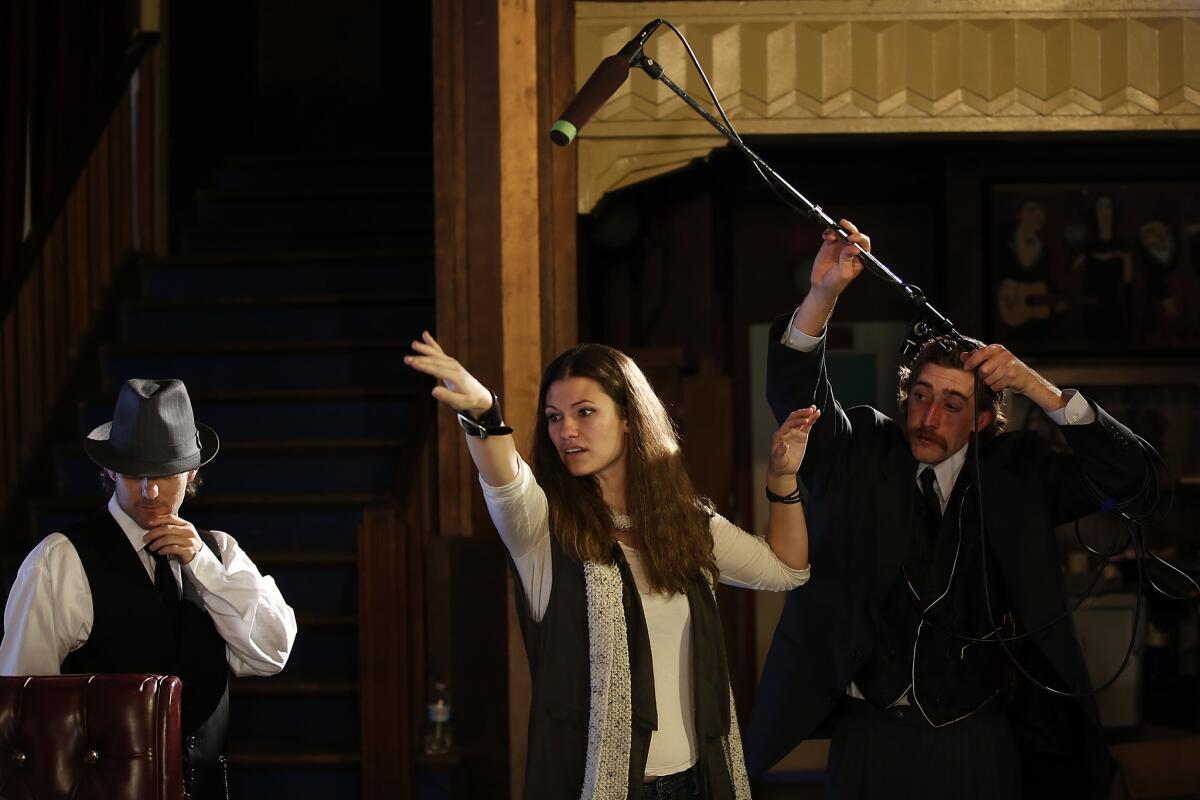Great Read: Low-budget films rely on shortcuts

In a quiet hillside home in Topanga Canyon, filmmaker Brian McGuire instructed his cast members to take their shirts off, put their sunglasses on, snort fake cocaine and “party hard.”
The 20-person cast and crew were filming a party scene for McGuire’s low-budget production in a “borrowed” home. Permission wasn’t a problem — a friend of McGuire’s who had helped decorate the house knew where the key was.
“We didn’t even think we were trespassing, really,” McGuire said of the home, which was on the market. “We figured we’d just shoot here on a weekend when we didn’t think anyone was coming.”
By the third and final day of shooting the scene for the film, a dark comedy called “Prevertere,” the party was going really well — no damage, decent footage. Then McGuire and crew had an unexpected guest.
“A Realtor showed up with a couple of clients to show the house, and we were there shooting out this crazy party scene,” McGuire said. “All of a sudden I’m hearing that cops are on their way. So we shot this whole number in 20 minutes, when it should have been in three hours … and packed up and ran out of the house.”
McGuire, 38, knows things aren’t always easy — or necessarily legal — when it comes to low-budget filmmaking, a world filled with improvisation, favors and shortcuts.
“I’ve been close to danger, but I’ve gotten out of it,” McGuire said. “If you ever do get questioned, there are tricks to avoid trouble.”
Some of McGuire’s favorite “tricks” include not using a tripod (“they can’t fine you if you don’t put a tripod on the ground”) or saying he’s filming a wedding video. Once, when filming downtown, McGuire had his crew push the cameraman around in a wheelchair to avoid getting busted.
The shaggy-haired filmmaker has made six low-budget films and is working on his seventh.
“I don’t think I’ve ever gotten a permit.”
::
Last year, permits for 584 feature films were sought from FilmL.A., the office that processes film permits in the city, said Philip Sokoloski, a spokesman for the office.
The movies had budgets as high as $170 million for the Marvel Studios hero flick “Captain America: The Winter Soldier,” which filmed mostly in the city.
But also filming on the streets of the city are super-low-budget films made by students and other Hollywood hopefuls, like McGuire, working with four-digit budgets.
Some are working without permits despite a city ordinance that makes it a misdemeanor to film without one.
The cost is almost certainly a large factor: A film permit through FilmL.A. costs a minimum of $625. Additional fees may be imposed by the city or county – depending on choice of locations and the “activities you plan to film,” according to its website.
Sokoloski said it’s harder for illegal filming to go unnoticed. In recent years, the Los Angeles Police Department has cracked down on unpermitted filming through its Contract Services Section.
“Revisions to L.A.’s film ordinance provided a clear legal mechanism for film permit enforcement,” he said. “LAPD’s choice to dedicate a unit to film permit approval and enforcement made enforcement efforts more consistent. [And] communities know the process that legal filming goes through, so illegal filming stands out.”
Sokoloski said the LAPD reported 34 permit citations in 2012 and 52 citations in 2013.
“Whenever a citation is issued, the unpermitted activity is also shut down immediately,” he said.
Low-budget filmmakers say it’s usually worth the hassle and occasional risk.
“People want to be part of something that’s cool and fun,” filmmaker David Lockhart said. “Low-budget filmmaking is about community and sharing your talents with others within that community.”
::
It took Lockhart only about 30 minutes to turn a Culver City dive bar into the set of a 1920s flashback scene for his $500,000 film “Lockhart.”
Although Lockhart is working with a larger budget than McGuire, he still uses a lot of tricks to save money. For this project, he did get a permit — but he said he’s avoided doing so with smaller films in the past.
As final preparations were being made to the set, the actors — dressed in boas, fedora hats, flapper dresses and suits — lounged around awaiting their cues. An actress loaned a fellow cast member red lipstick. On a piano on the bar’s stage, another actress quietly played “Young and Beautiful,” Lana del Rey’s song from “The Great Gatsby.”
The costumes? Borrowed. The bar? Owned by Lockhart’s friend and rented for the day with a big discount. The cast and crew? Mostly friends, many of whom Lockhart had met working on other low-budget films.
Most of the funding came from friends and family, Lockhart said.
He said it’s essential to trust the people on the set of such tight-knit projects. “They become family,” he said.
One of Lockhart’s friends, Mark Strano, traded in his usual behind-the-scenes role as a producer and writer to act in the film.
Strano said the experience was relatively tame compared with some of his past low-budget film experiences. Last year, Strano shot a party scene at a rented cabin in Central California for a feature.
“Everyone who was in the scene or helping on set was also sleeping in the cabin to save money,” he said. “We had mattresses labeled, like mattress A, mattress B.... It felt kind of like a brothel.”
::
Suzanne Lyons, the author of “Indie Film Producing: The Craft of Low-Budget Filmmaking,” said fundraising for a low-budget film can often stifle the creative process.
“Film funding is a gigantic issue for all of us,” she said, “and that one thing alone will get in the way of someone making their film.”
To raise money and awareness about their projects, many filmmakers flock to fundraising websites Kickstarter or GoFundMe. Some go straight to investors.
“I think you have to look ahead — you don’t even necessarily need distribution,” Lockhart said. “You can sell it on your own website or Netflix, iTunes. There’s no good way or bad way.”
McGuire, for example, uploads trailers of all his films onto his professional website, Brianmcguire.info, and Vimeo. Several of his films are also available for purchase on Amazon Instant Video, Google Play and iTunes.
But in the process of looking for a means to make the film, Lyons said people often forget to follow laws.
“What happens with us a lot of times in the indie world is we are so busy wearing the creative hat — which is important — but forget about the business hat,” she said.
Lyons said her No. 1 tip to aspiring filmmakers is “get your paperwork done.”
“Filmmaking can be easy if you take the right attitude and right approach,” she said.
::
In Highland Park, McGuire was back on a set, this time lending a hand to his friend, filmmaker Daniel Finkel. McGuire is going to act in Finkel’s film, a psychedelic comedy titled “Brain Pickle,” but on this day, he was just helping out with a promo.
Making a low-budget film is “really about bobbing and weaving and trying to accomplish your vision while maneuvering through problems,” Finkel said as he helped McGuire drape a green sheet over the living room wall in front of the tripod where a camera was set up.
Though Finkel hadn’t started shooting the movie yet, he said he hoped the promo, posted on Vimeo and the movie’s Facebook page, would generate buzz and funding. He planned to send the short clip to prospective investors as part of publicity packet for the film.
Finkel, bearded and in a beanie, paced back and forth in his living room.
“Have some snacks,” he said, gesturing to the kitchen where he had placed chips and beverages.
Shortly after room arrangements were made, Larry Lederman, a bald and animated actor who was playing a scientist in the film, put on a lab coat and positioned himself in front of the makeshift green screen.
He recited a line — “like an itch you couldn’t scratch” — over and over before asking Finkel, “Was that OK? Or was that too deep? Too quick?”
“Maybe a tiny bit quicker,” Finkel said. “Ready?”
Lederman nodded.
“You look great,” Finkel said.
The crew of four didn’t have a slate to write on — so they downloaded an app that’s a virtual slate. When it didn’t work, McGuire stepped in front of the camera and just used his hands.
“Take one,” he said, slowly walking out of the shot.
“Action.”
saba.hamedy@latimes.com
More to Read
From the Oscars to the Emmys.
Get the Envelope newsletter for exclusive awards season coverage, behind-the-scenes stories from the Envelope podcast and columnist Glenn Whipp’s must-read analysis.
You may occasionally receive promotional content from the Los Angeles Times.







